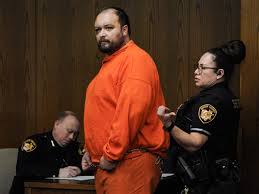Ohio Supreme Court Suspends Lawyer’s License Following Attempted Murder Charges in Toledo Restaurant Incidence
 The Ohio Supreme Court has made a significant decision by suspending the law license of Matthew Exton, an attorney implicated in a disturbing attempted murder case that unfolded at a Toledo restaurant. This action raises questions about the intersection of professional conduct and personal criminal behavior, especially for someone in a position of legal authority.
The Ohio Supreme Court has made a significant decision by suspending the law license of Matthew Exton, an attorney implicated in a disturbing attempted murder case that unfolded at a Toledo restaurant. This action raises questions about the intersection of professional conduct and personal criminal behavior, especially for someone in a position of legal authority.The suspension, announced on Wednesday, comes in response to allegations that Exton attempted to shoot his ex-wife during a violent altercation at Sabira, a newly opened establishment on South Huron Street. Reports indicate that the incident occurred in April, shortly after the restaurant commenced operations. Eyewitness accounts reveal a chaotic scene: as Exton reportedly tried to shoot his ex-wife, the safety on his firearm was still engaged, preventing the gun from discharging.
In a dramatic turn of events, bystanders, including restaurant employees and patrons, intervened. They managed to tackle Exton and subdue him until authorities arrived. The terrifying encounter was captured on video, which has since circulated widely, offering a glimpse into the potentially deadly confrontation. A Sabira employee was able to wrest the gun away from Exton and took it into the kitchen for safekeeping, highlighting the quick thinking and bravery of those present during the incident.
Exton now faces serious charges, including attempted murder and three counts of assault. His legal strategy appears to rest on a plea of not guilty by reason of insanity, which suggests that he may argue a lack of criminal responsibility due to mental health issues. As part of this defense, a competency evaluation is scheduled, a necessary step in determining whether he is fit to stand trial.
The implications of this case extend beyond the courtroom. As a licensed attorney operating law offices in Sylvania and Traverse City, Exton’s actions have significant repercussions for his practice and the reputation of the legal profession. The Ohio Supreme Court’s interim suspension of his license underscores the gravity of the allegations against him and reflects the legal community’s intolerance for behavior that contradicts the values of justice and respect for the law.
 This incident also casts a shadow over Sabira, which had just celebrated its grand opening with a ribbon-cutting ceremony hosted by the Toledo Regional Chamber of Commerce. The chamber had previously lauded the restaurant as a promising addition to Toledo’s culinary scene, highlighting its innovative menu and commitment to providing high-quality, globally inspired cuisine. Chef Moussa Salloukh, who leads Sabira, is known for his role in promoting modern Mediterranean cuisine in the region. This unfortunate incident, however, now intertwines the restaurant’s narrative with that of a violent crime, potentially impacting its reputation as it navigates the aftermath.
This incident also casts a shadow over Sabira, which had just celebrated its grand opening with a ribbon-cutting ceremony hosted by the Toledo Regional Chamber of Commerce. The chamber had previously lauded the restaurant as a promising addition to Toledo’s culinary scene, highlighting its innovative menu and commitment to providing high-quality, globally inspired cuisine. Chef Moussa Salloukh, who leads Sabira, is known for his role in promoting modern Mediterranean cuisine in the region. This unfortunate incident, however, now intertwines the restaurant’s narrative with that of a violent crime, potentially impacting its reputation as it navigates the aftermath.As communities reflect on this unfolding story, the incident raises important discussions about the prevalence of domestic violence and the responsibilities of individuals in positions of power. The shocking nature of the events at Sabira cannot be understated; it serves as a reminder of the fragility of safety in public spaces and the urgent need for better support systems for those affected by domestic violence.
Furthermore, the legal proceedings that follow will likely attract considerable attention, not just in Toledo but within the broader legal community. The outcome of Exton’s competency evaluation will play a crucial role in determining the trajectory of his case, including whether he is deemed fit to stand trial and how the charges against him will be resolved.
In conclusion, the Ohio Supreme Court’s suspension of Matthew Exton’s law license amid serious criminal charges reflects a critical moment of accountability in the legal profession. As this case progresses, it will undoubtedly raise further questions about mental health, domestic violence, and the responsibilities of legal professionals. The community, while shaken by the events at Sabira, will be watching closely as justice unfolds in this alarming incident.
Sources: